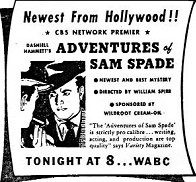
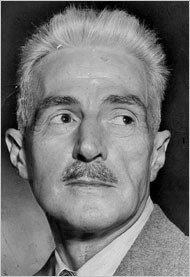 The Adventures of Sam Spade (1946-1951) aired “The Calcutta Trunk Caper” on June 8, 1947 as its 50th episode of approximately 243, only 74 of which are still in circulation (this includes 12 AFRS repeats and 2 rehearsal shows). We have previously aired but four episodes of this show, the first in 2014, and the fourth in May of 2020, two years ago. For newcomers, and as a refresher for long time listeners, we reprise the historical notes about the origins of Sam Spade as presented for background to that initial episode, with additional material added on the amazing Lurene Tuttle.
The Adventures of Sam Spade (1946-1951) aired “The Calcutta Trunk Caper” on June 8, 1947 as its 50th episode of approximately 243, only 74 of which are still in circulation (this includes 12 AFRS repeats and 2 rehearsal shows). We have previously aired but four episodes of this show, the first in 2014, and the fourth in May of 2020, two years ago. For newcomers, and as a refresher for long time listeners, we reprise the historical notes about the origins of Sam Spade as presented for background to that initial episode, with additional material added on the amazing Lurene Tuttle.
Sam Spade was the private detective and creation of Dashiell Hammett (1894-1961, photo top right). Based on Hammett’s time as a Pinkerton detective from people he knew or had heard about, Spade first appeared in the third of Hammett’s five novels, The Maltese Falcon, in 1930. Only three other stories, all short works, would feature Spade in magazines and all appeared in 1932. One final Spade story was published in 2013, over 50 years after his death in 1961. The Maltese Falcon was brought to film three times: 1931, 1936, and the now film noir classic of 1941 starring Humphrey Bogart, Mary Astor, Sydney Greenstreet, and Peter Lorre.
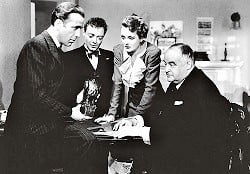
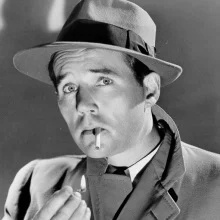 For all but its final radio season Howard Duff (1913-1990, photo at right) would star as Sam Spade and Lurene Tuttle would co-star as Spade’s secretary Effie Perrine. Duff would go on in later years to play various roles in quite a few films, and later with the advent of television would enjoy a lengthy career in many shows as star or character actor (drama and detective primarily) and was an easily recognizable presence on both the silver and small screens. Like Spade’s creator in the late 1940s (pre-HUAC, but Hammett failing to answer a Congressional Committee’s questions under oath stemming from his overt communist dealings), but years later and owing to a different set of circumstances, Duff found himself in the crosshairs of the early 1950s McCarthy-era House Unamerican Activities Committee (HUAC) and was labeled a communist subversive. It was at this point that this soft “blackballing” dovetailed with his burgeoning tv and film career that made it advantageous for him to leave the radio series, at which point Stephen Dunne would take over as the voice of Sam spade for the series’s final 1950-51 season. According to the writeup by Radio Spirits on their 2014 calendar, on which Duff has the November slot: “A lot of talent came out of the Armed Forces Radio Service at the conclusion of the Second World War. One of the most outstanding examples was an energetic young sergeant named Howard Duff, born on November 24, 1913. A staff announcer for many AFRS features during the war, he was ready for the big time as soon as he doffed the uniform. It didn’t take long for him to land the role of a lifetime, bringing Dashiell Hammett’s legendary private eye Sam Spade to the microphone. In his four years in the role, Duff did the impossible–he replaced Humphrey Bogart’s film version as the definitive embodiment of the Hammett character: tough, yet vulnerable; hardboiled, yet with a sense of humor about his weekly predicaments. Among the legions of postwar radio detectives, Duff’s Spade stood out as one of the few truly originals.”
For all but its final radio season Howard Duff (1913-1990, photo at right) would star as Sam Spade and Lurene Tuttle would co-star as Spade’s secretary Effie Perrine. Duff would go on in later years to play various roles in quite a few films, and later with the advent of television would enjoy a lengthy career in many shows as star or character actor (drama and detective primarily) and was an easily recognizable presence on both the silver and small screens. Like Spade’s creator in the late 1940s (pre-HUAC, but Hammett failing to answer a Congressional Committee’s questions under oath stemming from his overt communist dealings), but years later and owing to a different set of circumstances, Duff found himself in the crosshairs of the early 1950s McCarthy-era House Unamerican Activities Committee (HUAC) and was labeled a communist subversive. It was at this point that this soft “blackballing” dovetailed with his burgeoning tv and film career that made it advantageous for him to leave the radio series, at which point Stephen Dunne would take over as the voice of Sam spade for the series’s final 1950-51 season. According to the writeup by Radio Spirits on their 2014 calendar, on which Duff has the November slot: “A lot of talent came out of the Armed Forces Radio Service at the conclusion of the Second World War. One of the most outstanding examples was an energetic young sergeant named Howard Duff, born on November 24, 1913. A staff announcer for many AFRS features during the war, he was ready for the big time as soon as he doffed the uniform. It didn’t take long for him to land the role of a lifetime, bringing Dashiell Hammett’s legendary private eye Sam Spade to the microphone. In his four years in the role, Duff did the impossible–he replaced Humphrey Bogart’s film version as the definitive embodiment of the Hammett character: tough, yet vulnerable; hardboiled, yet with a sense of humor about his weekly predicaments. Among the legions of postwar radio detectives, Duff’s Spade stood out as one of the few truly originals.”
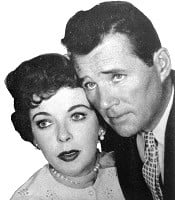 Duff would marry one of the most respected and groundbreaking women actors and directors in film history in 1951, Ida Lupino (1918-1995, Lupino & Duff photo at right). The two would star together in several films throughout the 1950s. As to Duff’s film and television appearances, they are too numerous to mention all of them here, though a sampling may recall him to many a fan of the films and TV shows in which he appeared: Films–The Naked City (1948), While the City Sleeps (1956, with Ida Lupino), and Kramer vs. Kramer (1979); Television–The Rockford Files, The Golden Girls, Knots Landing, Dallas, as “Capt.” Thomas Magnum, II–grandfather of Thomas Magnum starring Tom Selleck on Magnum, P.I. His genre credits include an episode of The Twilight Zone and Batman (“The Entrancing Dr. Cassandra” with Ida Lupino).
Duff would marry one of the most respected and groundbreaking women actors and directors in film history in 1951, Ida Lupino (1918-1995, Lupino & Duff photo at right). The two would star together in several films throughout the 1950s. As to Duff’s film and television appearances, they are too numerous to mention all of them here, though a sampling may recall him to many a fan of the films and TV shows in which he appeared: Films–The Naked City (1948), While the City Sleeps (1956, with Ida Lupino), and Kramer vs. Kramer (1979); Television–The Rockford Files, The Golden Girls, Knots Landing, Dallas, as “Capt.” Thomas Magnum, II–grandfather of Thomas Magnum starring Tom Selleck on Magnum, P.I. His genre credits include an episode of The Twilight Zone and Batman (“The Entrancing Dr. Cassandra” with Ida Lupino).
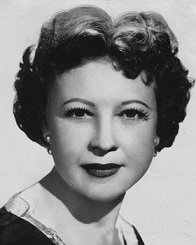
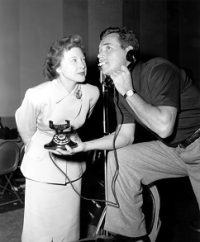 Lurene Tuttle (1907-1986) was known as “The First Lady of Radio,” sometimes appearing in 15 different shows a week. Dragnet, The Whistler, Lux Radio Theater, Suspense, and The Great Gildersleeve were but a scant few of the many shows she would appear in over the years. One of her most memorable roles was as Sam Spade’s secretary Effie Perrine. She also played virtually every other female character on the show as well, a tribute to her immense talent and versatility. She transitioned from vaudeville to radio, and from radio to film and television, appearing in some 50 films (credited and uncredited), and dozens and dozens of television programs, a few of which were Leave it to Beaver, The Andy Griffith Show, Fantasy Island, Dennis the Menace, Little House on the Prairie, Bonanza, Gunsmoke, and I Dream of Jeannie. Lurene Tuttle was honored with two stars on the Hollywood Walk of Fame, one for radio and one for television. She died of cancer on May 28, 1986 in a hospital in Encino, California. Long time Sam Spade co-star Howard Duff delivered her eulogy.
Lurene Tuttle (1907-1986) was known as “The First Lady of Radio,” sometimes appearing in 15 different shows a week. Dragnet, The Whistler, Lux Radio Theater, Suspense, and The Great Gildersleeve were but a scant few of the many shows she would appear in over the years. One of her most memorable roles was as Sam Spade’s secretary Effie Perrine. She also played virtually every other female character on the show as well, a tribute to her immense talent and versatility. She transitioned from vaudeville to radio, and from radio to film and television, appearing in some 50 films (credited and uncredited), and dozens and dozens of television programs, a few of which were Leave it to Beaver, The Andy Griffith Show, Fantasy Island, Dennis the Menace, Little House on the Prairie, Bonanza, Gunsmoke, and I Dream of Jeannie. Lurene Tuttle was honored with two stars on the Hollywood Walk of Fame, one for radio and one for television. She died of cancer on May 28, 1986 in a hospital in Encino, California. Long time Sam Spade co-star Howard Duff delivered her eulogy.
This episode of The Adventures of Sam Spade opens as many of the shows do, with Sam making a telephone call to Effie. This time he is calling to let her know he has made it home from his recent voyage to Calcutta, India. At first thinking her boss is joking, Sam explains that he is deadly serious and telling the truth, and then begins to tell Effie of his latest caper. It began innocently enough (don’t they all?) with Sam being hired by a woman who wants him to talk her sister out of marrying a man she is convinced is no good. An odd assignment and not sure what he can really do to persuade the bride-to-be to change her mind, Sam soon finds himself in the midst of a situation far more dangerous than his client’s simple request has led him to believe. Lies are uncovered, murders revealed, and in the midst of it all Sam is shanghaied on a slow boat to Calcutta with no money and only his wits to help him out of this unexpected fix, successfully carrying out his client’s contract now the least of his worries. When all is said and done, this at-first-glance “easy assignment” ends up crossing the wire as one of the more lively of Sam’s adventures, and can now be found in Sam’s voluminous files titled fittingly as “The Calcutta Trunk Caper.”
Play Time: 24:37
{This Sam Spade episode aired on a Sunday evening in early June of 1947. The school year had recently ended and summer vacation loomed ahead as far as the young eyes of the neighborhood gang could see, who would without question head for the corner newsstand the next morning, no doubt in the mood for more detective or crime stories. Black Mask (1920-51) was a must buy, one source calling it “the finest detective pulp magazine ever published.” It was a bi-monthly in 1947. Street & Smith’s Detective Story (1915-53) can justifiably lay claim to being the first pulp magazine devoted to detective fiction. Its long run is testament to its publisher’s foresight. S&S Detective Story was a monthly in 1947. New Detective (1941-55) ran the usual gamut of crime stories within its pages but with an emphasis on police detectives. It was a bi-monthly in 1947. From 1953-55 it retitled itself as Fifteen Detective Stories. But then in 1955 until its demise in 1971 it dropped the detective format altogether and became a men’s magazine titled True Adventure.}
[Left: Black Mask, May 1947 – Center: Detective Story, June 1947 – Right: New Detective, July 1947]
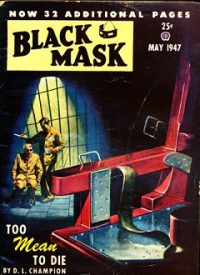
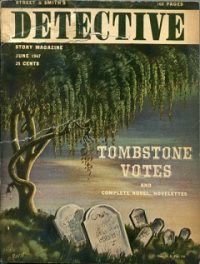
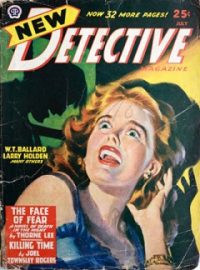
To view the entire list of Old Time Radio episodes go here.